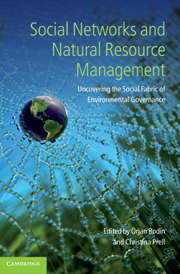 Social Networks and Natural Resource Management
Social Networks and Natural Resource Management from Part II - Case studies
Published online by Cambridge University Press: 05 June 2012
Introduction: orientation to network analysis for natural resource usage
The analysis of social networks has tremendous capacity to inform social science and policy about how people extract natural resources (e.g. Prell et al., 2009). Attention to social networks frees us from the typical assumptions that individuals act independently or are independent conditional on membership in common organizations (Frank, 1998). Instead attention to social networks embraces the relational (Emirbayer, 1997), and, as it does so, provides a potential bridge between different disciplines and modes of research.
To save this book to your Kindle, first ensure [email protected] is added to your Approved Personal Document E-mail List under your Personal Document Settings on the Manage Your Content and Devices page of your Amazon account. Then enter the ‘name’ part of your Kindle email address below. Find out more about saving to your Kindle.
Note you can select to save to either the @free.kindle.com or @kindle.com variations. ‘@free.kindle.com’ emails are free but can only be saved to your device when it is connected to wi-fi. ‘@kindle.com’ emails can be delivered even when you are not connected to wi-fi, but note that service fees apply.
Find out more about the Kindle Personal Document Service.
To save content items to your account, please confirm that you agree to abide by our usage policies. If this is the first time you use this feature, you will be asked to authorise Cambridge Core to connect with your account. Find out more about saving content to Dropbox.
To save content items to your account, please confirm that you agree to abide by our usage policies. If this is the first time you use this feature, you will be asked to authorise Cambridge Core to connect with your account. Find out more about saving content to Google Drive.